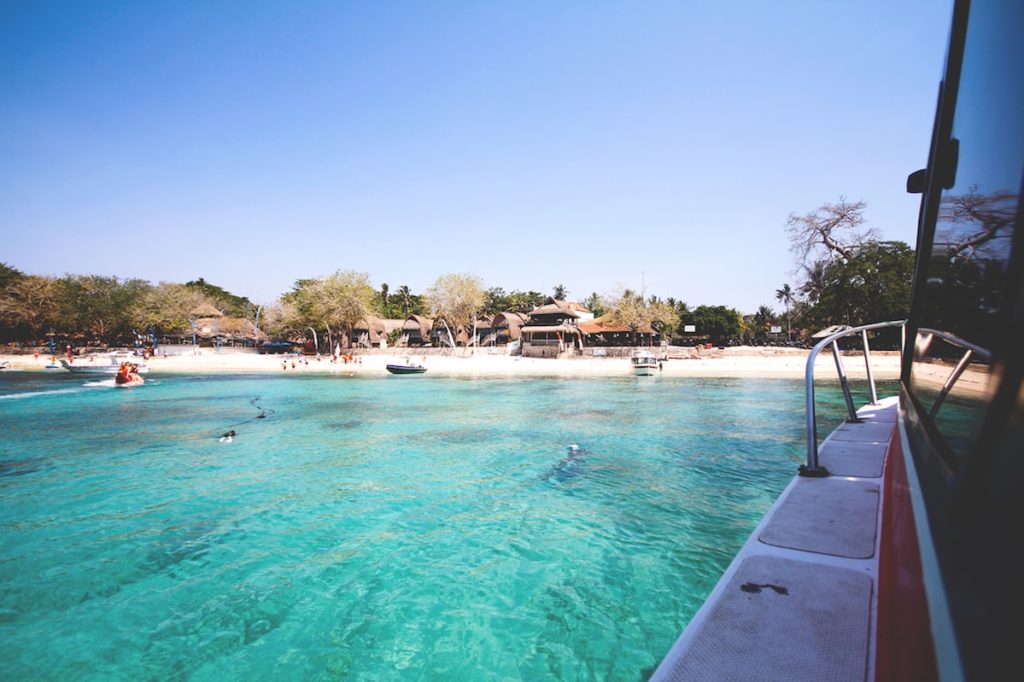Indonesia, an absolute highlight on your backpacking trip through Asia or as a long-distance destination to escape the German winter. Have you been dreaming of walks through lush green rice terraces, along white sandy beaches, picturesque temples, or a surfing holiday in Bali? What are you waiting for? Before your departure, you should definitely familiarize yourself with the entry requirements for Indonesia. In the following article, I have summarized all the important information about the visa for Indonesia so that nothing stands in the way of your dream trip to the land of 17,000 islands. Look forward to sunshine, beaming people, cultural highlights, delicious food, and unforgettable moments.
- Entry into Indonesia
- Free Visa | 30 days (without extension)
- Visa on Arrival | 30 days (with extension)
- Apply for extension on site
- Visa Run Indonesia
- Visit Visa | 60 – 180 days
- Customs regulations
- Health & vaccinations
- International health insurance
Entry into Indonesia
As a German citizen, you will definitely need a passport to enter Indonesia, which must be valid for at least 6 months after your entry into Indonesia and has two blank pages. Entry with a temporary passport is also possible with a visa issued before entry. Unfortunately, an ID card alone is not enough here.

You will also need a valid return ticket or a connecting flight to another country before departing from Germany. Shortly before landing on the plane, you will be given two forms: one for entry and exit, and another for customs regulations. Fill out both forms and present them along with your passport at the immigration desk. Generally, you do not need a visa to enter Indonesia. You can find out what options you have in the following sections.
Free Visa | 30 days (without extension)
If you plan to travel to Indonesia for 30 days or less, you do not need to apply for a visa in advance. It is sufficient to have the above-mentioned documents (passport, return ticket, and customs forms) with you. At the immigration counter, you will then receive a free 30-day visa stamped in your passport. Important: This visa cannot be extended; you must leave the country after 30 days at the latest. However, the Free Visa is sufficient for a normal vacation on one of Indonesia’s beautiful islands, so you don’t need to worry about anything in advance.

Visa on Arrival | 30 days (with extension)
If you enjoy the green rice terraces, volcanoes, and white sandy beaches so much that you want to extend your stay, you can apply for a paid Visa on Arrival upon entry. This will cost you around USD 35. Upon arrival, simply go to the Visa on Arrival (VoA) payment counter, pay there, and then proceed to the immigration counter with your receipt and documents. There, you’ll receive a sticker in your passport that allows you to extend your visa for another 30 days on-site. Learn how this works now.

Apply for an extension on-site
Marco and Bolle extended their second stay in Indonesia. They contacted an agency that handled all the necessary steps. You can, of course, also take care of everything yourself, but that takes much longer. Having an agency on your side is also much more relaxed, less time-consuming, and you don’t have to go to the immigration office three times.
If you want to handle your passport extension on your own, you’ll have to go to the immigration office (Imigrasi) at least three times. You’ll have to go there once to submit your passport and forms, a second time for fingerprinting and photos, and a third time to pick up your passport. Getting there by scooter is always a long way, especially if you’re staying in Canggu or somewhere else. The extension will cost around 500,000 IDR (32€).
An agency will take care of some of the steps for you. Bolle and Marco hired the agency Visa4Bali, which first picked up their passports from their accommodation. In the following days, they repeatedly contacted the agency via WhatsApp. Then the two had to go to the Imigrasi, where they had met with the agency to have their fingerprints and photos taken. Their passports were then brought to their accommodation relatively quickly, along with the visa extension. They paid approximately 700,000 IDR (45€).
Visa Run Indonesia
Now you’re probably wondering: What is a visa run? A visa run is simply extending a visa by leaving a neighboring country and re-entering. In many countries, so-called visa runs are no longer tolerated. Indonesia is less strict. So, if you were in the country for 30 days with a Free Visa and enjoyed it so much that you’d like to stay a little longer, you can take a cheap flight (boat, bus, or car) to one of the neighboring countries for at least one day, spend the night there, and return to Indonesia the next day.

Many people travel frequently to Singapore, Thailand, and Kuala Lumpur. While a visa run is currently still tolerated, in my opinion it’s certainly not the best or most straightforward way to extend a visa. Flights and accommodation also cost a lot of money. Instead, use the Visa on Arrival for 35 USD or apply for a Visit Visa directly in Germany. This allows you to stay in the country for between 60 and 180 days without having to leave the country or worry about an extension.
Visit Visa | 60 – 180 Days
You can apply for a visit visa at a consulate, for example, in Berlin, Frankfurt, or Hamburg, before you leave Germany. Please note that you should apply for the visa no earlier than 8 weeks and no later than 4 weeks before your actual departure. Bolle and Marco started their world trip in Indonesia and obtained a visa in advance in Berlin. And hey, it’s not as complicated as it might sound.
Apply for a visa for Indonesia
- Completed visa application (application & checklist here)
- 2x color photos (35 x 45 mm)
- Original passport and copy
- Copy of flight booking/confirmation or e-ticket
- Fee: €50 in Berlin, €45 in Frankfurt & Hamburg
- Proof of fee transfer
- By mail: stamped return envelope (registered mail)
- Sometimes they also want to see bank statements
Processing time varies depending on the employee. For Bolle and Marco, it took about 3 weeks until they could collect their passports and visas. Important for you: When you get your passport back, don’t be surprised by the “expiry date.” This indicates the last possible entry, not the exit date. The 60 days start counting as soon as you enter the country. Be careful not to overstay your stay, as this can be expensive. For every day you are in the country illegally, you will have to pay a hefty 1,000,000 IDR (€65).
You can extend your Visit Visa four times for another 30 days. This means you could stay in Indonesia for a full six months if you have the time and inclination. However, in most cases, you will need a sponsor/local who will assume liability for you. In most cases, you must have a sponsor when extending your visa, i.e. a local who will assume liability for you. It’s best to arrange such extensions through an agency.
Customs Regulations
Before traveling to Indonesia, it’s important to familiarize yourself with the country’s import and export regulations. You can import personal items duty-free, such as 200 cigarettes, 50 cigars, or 100g of tobacco and 1 liter of spirits. Gifts worth up to $100 are also acceptable. The amount of money imported into Indonesia is limited to 100 million rupiah. Currently, this is just under €6,300. The import of illegal substances and weapons is prohibited, as in many other countries.
Health & Vaccinations
When entering Indonesia from Germany, you will not be checked for specific vaccinations. However, if you wish to enter Indonesia from a yellow fever region, you must present a valid yellow fever vaccination. Generally, there are several vaccinations recommended by tropical doctors for your stay on the tropical island. These include tetanus, diphtheria, poliomyelitis, hepatitis A, rabies, and typhoid. It’s best to check this information here: Tropical Institute & Indonesia.

If you’re unsure which of these vaccinations are important for you, I recommend making an appointment with a tropical doctor who can advise you. Indonesia is also a malaria area. There is a higher risk in Irian Jaya / West Papua and on the island of Sumba. The risk, however, is lower on Sumatra, Bali, Java, and Sulawesi. Unfortunately, there is no malaria vaccination, but there are malaria prophylactic tablets available. Consult a tropical medicine specialist for detailed advice on this as well.
International Health Insurance
International travel insurance is essential. Anything can happen at any time, and in countries outside the EU, it can quickly become expensive. To avoid the financial risk, you should get international health insurance. There are numerous providers, which usually offer a one-year policy and a travel period of 6-8 weeks per trip. The benefits are important, so you should compare and thoroughly check them. International health insurance is available starting at €8 per year (The best international health insurance*).